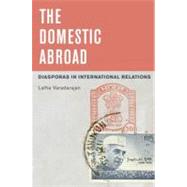The Domestic Abroad Diasporas in International Relations
, by Varadarajan, Latha- ISBN: 9780199733910 | 0199733910
- Cover: Hardcover
- Copyright: 10/8/2010
The past few decades have seen the emergence of a striking phenomenon across disparate geographical contexts: the adoption of a series of state policies and initiatives aimed at institutionalizing the relationship between nation-states and the groups constituted as "their" diasporas. Despite the existence of informal (and in some cases, formal) links between diasporas and their homelands in the past, we are now witnessing a far more widespread and qualitatively different phenomenon. This book theorizes this novel, largely overlooked phenomenon, by introducing the concept of the "domestic abroad." It develops the argument that the production of the domestic abroad rests, first, on the constitution of diasporas as subjects of an expanded, territorially diffused nation and the proliferation of institutional links connecting this "global" nation. But the domestic abroad is also a product of the economic transformation of the state, what is typically called neoliberal re-structuring. The Domestic Abroad shows the ways in which these two processes--political and economic, affecting nation and state--far from being distinct, are in fact intimately related. Empirically, this argument unfolds in the latter half of the book through a historically nuanced study of the production of the Indian domestic abroad. The book explains the political logic, and traces the complex history of the remarkable transition from the Indian state's guarded indifference toward the diaspora in the period after independence, to its ongoing breathless celebrations of the "global Indian nation." In doing so, it highlights the structuring and re-structuring of postcolonial India to reveal the manner in which the boundaries of the Indian nation and the extent of the authority of the Indian state are dynamically shaped by the development of capitalist social relations on both global and national scales.







